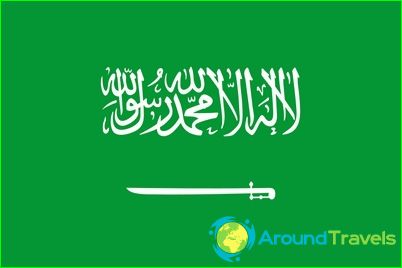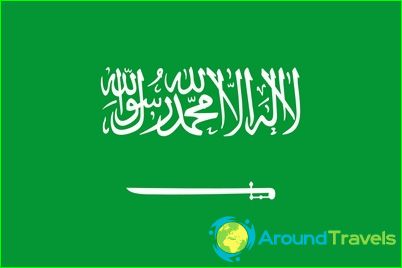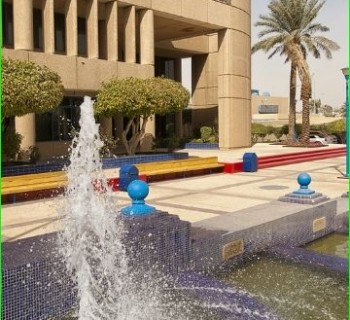Saudi Arabia flag

The Kingdom of Saudi Arabia uses the national flag as one of its state symbols.
Description and proportions of the flag of Saudi Arabia
The flag of Saudi Arabia is a dark green rectangle with a shahada and a sword inscribed in white. The flag should be read equally on both sides, and therefore it is sewn from two identical panels.
Shahada is the main position of the creed in Islam. It arose as an exclamation by which Muslims distinguish the Gentiles. She was included throughout the entire period of the existence of the religion in all Islamic prayers. Having served as a battle cry for many generations of defenders and warriors of the Arabian land, the shahada became the reason for the emergence of the concept «martyr».
The sword applied to the flag of Saudi Arabia below the shahada symbolizes the victories of the man whom the people of the country consider to be its founder. Abdel Aziz ibn Saud was the first king of the country and fought wars for the unification of Arabia.
The Shahada on the flag of Saudi Arabia is a sacred symbol for Muslims. That is why the image of the flag on clothing, souvenirs and other paraphernalia is officially prohibited..
An interesting feature of the flag is that it is never lowered on the occasion of mourning, no matter where in the world it is..
History of the flag of Saudi Arabia
A green cloth with a shahada woven on it is a symbol of the Wahhabi ideology that appeared in the 18th century on the Arabian Peninsula. The precursors of the modern kingdom were the states of Hejaz and Nejd. At the beginning of the twentieth century, inscriptions in Arabic script, made in white, appeared for the first time on the green field of the Najd flag. In 1921, Abdel-Aziz ibn-Saud added the image of a sword to the cloth. Then the flag of the state of Nejd was slightly modified and a white stripe appeared along its flagpole, the width of which changed several times.
Meanwhile, the Hejaz flag had the appearance of a classic tricolor with white, green and black stripes running horizontally. Then an isosceles dark red triangle was added to its panel, located with its base along the shaft.
In 1932, Nejd and Hijaz, at the cost of the efforts of Abdel Aziz ibn Saud, were united into the state of Saudi Arabia, and six years later the flag of Saudi Arabia was adopted in its present form. It was officially approved as a state symbol in March 1973..



